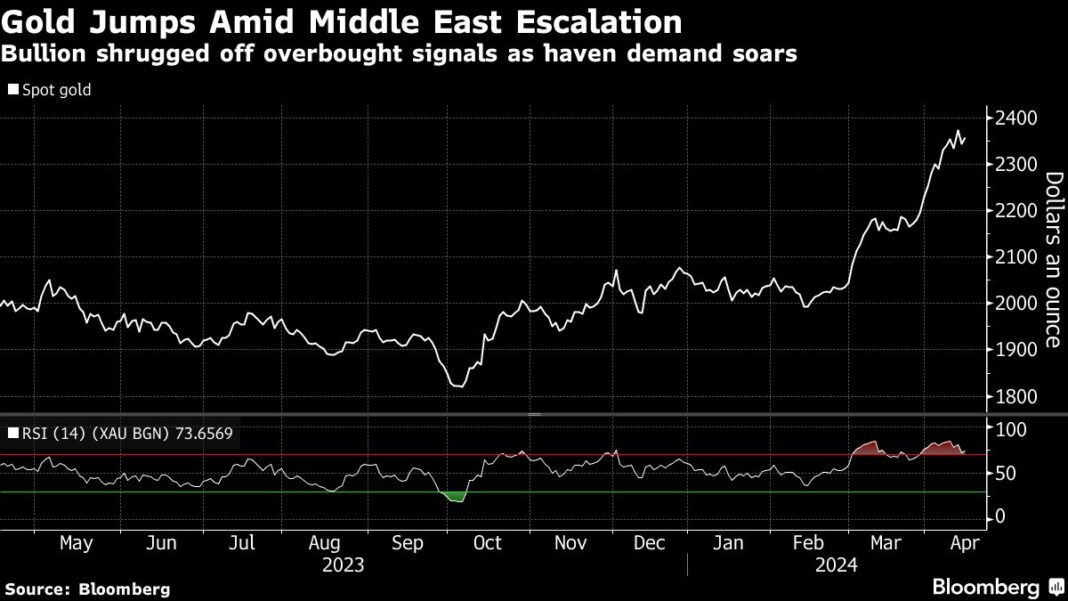(Bloomberg) — Shares in Asia slipped to the lowest in six weeks, tracking Friday’s drop in US equities, as markets grappled with simmering tensions in the Middle East, disappointing bank earnings and the prospect of the Federal Reserve keeping interest rates higher for longer.
Most Read from Bloomberg
Equity benchmarks in Japan, South Korea and Australia all declined while Hong Kong stock futures also fell after the S&P 500 suffered its worst session since January on Friday amid a flight to safety.
But global markets showed signs of stability even after unprecedented attack on Israel at the weekend. Iran said “the matter can be deemed concluded,” and President Joe Biden reportedly told Israeli Prime Minister Benjamin Netanyahu that the US won’t support an Israeli counterattack against Iran.
Most Group-of-10 currencies strengthened against the greenback Monday while Treasures steadied in early Asian trading after yields slipped in the previous session. Gold rose amid driving demand for haven assets, while aluminum and nickel surged following new US and UK sanctions that banned deliveries of any Russian supplies after midnight on Friday.
“The muted market response likely stems from the highly intricate sentiment in the market at this stage: market participants are certainly not giving up hope that the past weekend’s events were just a one-off occurrence, while holding their breath for what could happen next,” said Hebe Chen, an analyst at IG Markets.
In Asia, Chinese equities are set for a tough week after a miss in the nation’s trade data Friday. Even if the global risk mood improves and Middle East tensions subside, Chinese stocks may see headwinds of their own to overcome. Authorities may hold a key interest rate and make liquidity abundant this week when a policy loan matures.
Elsewhere, developer China Vanke Co. said it’s making plans to resolve liquidity pressure and short-term operational difficulties as China’s top leaders have grown increasingly alarmed about the country’s protracted real estate crisis and its effect on the sluggish economy.
With investors already rattled by sticky inflation and the prospect of higher-for-longer interest rates, the escalation of the Middle East crisis may inject fresh volatility into markets. As the conflict widens, many say oil could surpass $100 a barrel and expect a flight to Treasuries, gold and the dollar, along with further stock-market losses.
Bitcoin rallied after it sank almost 9% in the wake of the attacks. Stock markets in Saudi Arabia and Qatar posted modest losses under thin trading volumes on Sunday. Israel’s equity benchmark fluctuated between gains and losses at least nine times before closing with a small gain.
Oil mostly shrugged off the attacks, with gains held in check by speculation that the conflict would remain contained. Brent crude is already up almost 20% this year and last traded around $90 a barrel.
As Wall Street’s earnings season kicked off, big banks’ results offered the latest window into how the US economy is faring amid an interest-rate trajectory muddied by persistent inflation.
JPMorgan Chase & Co. and Wells Fargo & Co. both reported net interest income — the earnings they generate from lending — that missed estimates amid increasing funding costs. Citigroup Inc.’s profit topped analysts’ estimates as corporations tapped markets for financing and consumers leaned on credit cards — signs that a prolonged period of elevated interest rates will benefit big banks.
“Many economic indicators continue to be favorable. However, looking ahead, we remain alert to a number of significant uncertain forces,” JPMorgan’s Chief Executive Officer Jamie Dimon said. He cited the wars, growing geopolitical tensions, persistent inflationary pressures and the effects of quantitative tightening.
Traders will soon shift to looming economic data as they refine bets on central bank easing cycles, as well as the International Monetary Fund and World Bank spring meetings in Washington. This week, Chinese growth data and Japan, Eurozone and UK inflation readings are due.
Key events this week:
-
Eurozone industrial production, Monday
-
US retail sales, empire manufacturing, business inventories, Monday
-
Federal income taxes due in the US, Monday
-
IMF and World Bank spring meetings start in Washington, Monday. The main ministerial meetings will be held April 17-19
-
Canada CPI, Tuesday
-
China property prices, retail sales, industrial production, GDP, Tuesday
-
UK jobless claims, unemployment, Tuesday
-
New Zealand home sales, CPI, Wednesday
-
Eurozone CPI, Wednesday
-
UK CPI, Wednesday
-
Australia unemployment, Thursday
-
Japan CPI, Friday
-
India’s elections begin, Friday
Some of the main moves in markets:
Stocks
-
S&P 500 futures rose 0.2% as of 10:04 a.m. Tokyo time
-
Hang Seng futures fell 1.7%
-
Nikkei 225 futures (OSE) fell 1.3%
-
Japan’s Topix fell 0.9%
-
Australia’s S&P/ASX 200 fell 0.5%
-
Euro Stoxx 50 futures were little changed
Currencies
-
The Bloomberg Dollar Spot Index was little changed
-
The euro was little changed at $1.0646
-
The Japanese yen fell 0.2% to 153.48 per dollar
-
The offshore yuan was little changed at 7.2640 per dollar
-
The Australian dollar was little changed at $0.6471
Cryptocurrencies
-
Bitcoin rose 2.5% to $65,468.73
-
Ether rose 1.5% to $3,113.65
Bonds
-
The yield on 10-year Treasuries was little changed at 4.53%
-
Japan’s 10-year yield declined one basis point to 0.840%
-
Australia’s 10-year yield declined five basis points to 4.21%
Commodities
-
West Texas Intermediate crude fell 0.7% to $85.03 a barrel
-
Spot gold rose 0.4% to $2,354.66 an ounce
This story was produced with the assistance of Bloomberg Automation.
Most Read from Bloomberg Businessweek
©2024 Bloomberg L.P.


